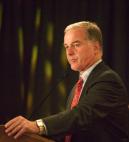A Tribute to Coretta Scott King
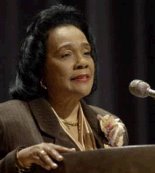
Coretta Scott King
4-27-1927 - 1-30-2006
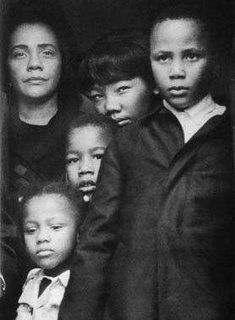
On June 18, 1953, Martin Luther King Sr. married his son, Martin Luther King Jr. and Coretta Scott.
The couple returned to the South to work on the civil liberties of Black Americans. By 1964, King was the mother of four children: Yolanda, Martin Luther King III, Dexter Scott, and Bernice Albertine. Think about the life that Coretta Scott King lived. Listen to words about the time and place where history put Coretta. Her son Dexter Scott Kinghas written about his family:
"When my mother became pregnant with me, the family was moving to Atlanta from Montgomery, Alabama, where my father had been pastor of Dexter Avenue Baptist Church. He'd become famous or infamous there, depending on one's slant, as one of the architects of the Montgomery bus boycott. That action was spawned by Mrs. Rosa Parks's refusal to give up her seat on a city transit bus, a watershed event of the Civil Rights Movement. We moved to Atlanta after that."Dexter Scott reminds us that his mother protected her children from some of the harsh realities and always made them feel supported and cared for.
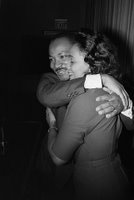
Our home at 234 Sunset was kind of home central, the neighborhood headquarters. All the kids came by to play. My mom treated them like hers, which wasn't always reassuring for them. Coretta Scott King was a disciplinarian, took no guff from hers or any others. Froze you with a look. "Time out" was a call we made in football, not what fell from her lips in our direction. Under her eye or not, we'd play "hide-and-go-seek," as we called it, football, softball, kickball, tag, marbles in the red clay; we'd spin tops, ride homemade skateboards, "pull" friends along by pedaling bikes standing up as the friend rode on the passenger seat. We had a swing set, seesaw, and slide. I loved the slide. I loved playing on the gym set. I loved it all, really. We had a hoop too. Ours was, in these regards, a typical family home—or so I thought back then.Dexter Scott came to a gradual awareness of the invisible lines that separated the races in the 1960s South, and he makes it apparent that even though his mother personally struggled alongside her husband to erase those lines, the hardship was never made an issue for her young children. She allowed them to be children - innocent, happy, and well-loved.
As children, we didn't know we were "Negroes," or if we did, we didn't know exactly what that meant. We didn't realize we lived in "segregation," didn't know there were better pools than the one we crowded into at the Y, or that we and our friends would be considered "have-nots" if our father wasn't the co-pastor of Ebenezer Baptist Church. We weren't aware that we could and would be turned away from public accommodations, educational institutions, or turned away from desirable living spaces by the real estate restrictive covenants. We weren't aware that we were shunned by society, murdered over mere glances, made to feel less than human. We were children, and children are more than human; we were blessed, but sooner or later we'd grow up and have to face this prison of segregation, unless Daddy won his struggle. There was this great social upheaval, this "great getting-up morning" going on that would redefine our lives and existences, and those of the people around us.

Dexter Scott has memories of how a young Senator named John F. Kennedy cared about his family and called Mrs. King when her husband had been sentenced to hard labor in a Georgia prison for taking part in a lunch-counter demonstration at Rich's department store, protesting segregated eating facilities—the only time he joined any such local demonstration in his hometown of Atlanta.:
My mother spoke with Senator Kennedy; he said he knew it must be hard, he knew she was expecting; if there was anything he could do feel free to call.

On April 4, 1968, the innocence of those children met a shattering reality. Coretta Scott King's husband was shot and killed while giving a speech on a hotel balcony. She knew that she had to be strong for her children and to continue the work of her husband.
Mrs. King has always spoken out for human rights and freedom for all people. She was involved in the opposition of the death penalty. Although Mrs. King had lost her husband and mother-in-law to gun violence, she cannot accept the judgment that their killers deserve to be executed. She believed that the death penalty continues the cycle of violence and destroys all hope for a decent society. Mrs. King said:
"As one whose husband and mother-in-law have died the victims of murder assassination, I stand firmly and unequivocally opposed to the death penalty for those convicted of capital offenses. An evil deed is not redeemed by an evil deed of retaliation. Justice is never advanced in the tacking of a human life. Morality is never upheld by a legalized murder."
Another of King's passions is the International Peace Movement. In 1985, she was arrested while protesting the South African Government's policy of racial segregation known as apartheid.
In 1986, Martin's birthday, January 15, became a national holiday because of her dedication to the acknowledgements of her husband's achievements.
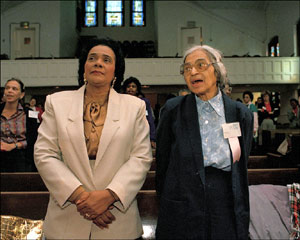
She never let the world forget the courageous actions of Rosa Parks.

We shall not forget Coretta Scott King. We know she's marching today with her Martin in Heaven.
Sources:
African American Registry
twbookmark.com


